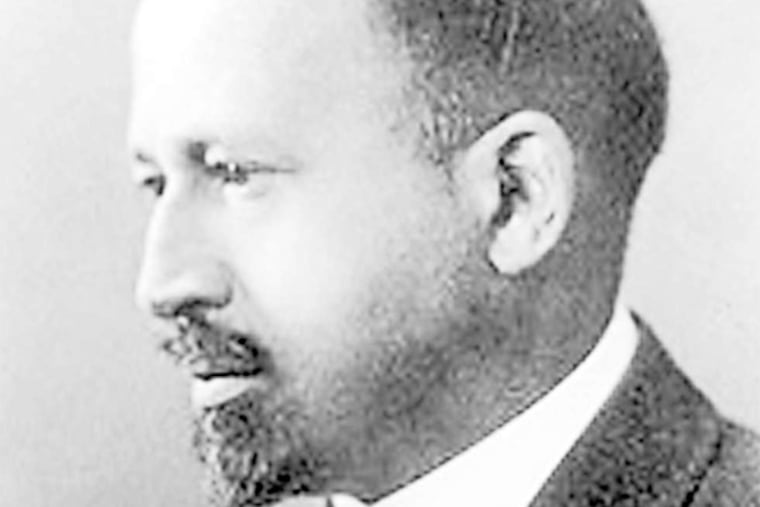The legacy of W.E.B. DuBois and the NAACP
Knowing the National Association for the Advancement of Colored People was coming to Philadelphia for its 106th annual convention, I asked David Levering Lewis, emeritus professor of history at New York University, to share his thoughts about the NAACP's past and future.

Knowing the National Association for the Advancement of Colored People was coming to Philadelphia for its 106th annual convention, I asked David Levering Lewis, emeritus professor of history at New York University, to share his thoughts about the NAACP's past and future.
Lewis won two Pulitzer Prizes for his biographies of W.E.B. DuBois, a founder of the NAACP who also led its precursor, the Niagara Movement, an association of African American intellectuals who criticized the renowned black educator Booker T. Washington for accommodating whites instead of demanding equal rights.
My conversation with Lewis, whom I had met years ago at a National Association of Black Journalists convention, occurred via the e-mailed questions and answers below:
Question: What was the situation for African Americans when the NAACP was founded in 1909?
Answer: The Springfield [Ill.] Race Riot of the previous year had shocked the nation and proved that the "race problem" was a national phenomenon, not a Southern aberration. Excluded from organized labor unions; their voter representation reduced to nominal numbers in the South [after 1890]; public education in the South severely restricted; physical segregation in public spaces, transportation, entertainment, places of business, and commerce after Plessy v. Ferguson and the 1906 Atlanta Riot; compelled to renounce the right to the ballot and to embrace the submissive political philosophy of Booker T. Washington, it is fair to say that the African American situation was dire.
Q: Of the NAACP's 60-plus founding members, only seven were black, including W.E.B. DuBois. Was he held in as high esteem then as he is today, or known mostly among scholars?
A: DuBois was already broadly known to the black majority because of the powerful impact of his 1903 book The Souls of Black Folk, a sociological treatise on the condition of African Americans.
Q: What was the Niagara Movement, and how did DuBois come to be associated with it?
A: DuBois founded the Niagara Movement in 1905. A shorthand characterization of it would be to say that it was composed of less than 50 men (and a few women) drawn from the Talented Tenth among African Americans.
Q: Was the NAACP ever envisioned as a protest organization along the lines of the Southern Christian Leadership Conference, which was cofounded by the Rev. Martin Luther King Jr. in 1957?
A: It was, indeed, envisioned as an activist organization, but its protest tactics were more genteel than those of the SCLC and were focused on propaganda and litigation.
Q: Did the different perspectives of those two groups in the 1960s make them rivals, and, if so, was that to the disadvantage of the older organization?
A: There was rivalry between the NAACP and the SCLC based on leadership personalities, competition for funds, and philosophy (lobbying and litigation vs. nonviolent protest and disruption). Fair to say, the activism of the SCLC (and the Student Nonviolent Coordinating Committee) created crisis situations that the NAACP's legal wing helped turn into lawsuits, legislation.
Q: How would you compare the concerns of African Americans today to what inspired the creation of the NAACP?
A: Voting rights and affirmative access to education are again with us today as primary imperatives. Prison reform and reform of the criminal justice system, however, are recent imperatives that neither the NAACP nor the SCLC gave sufficient recognition to.
Q: The NAACP didn't have a very visible role in the recent protests nationally against abusive police tactics. Does that mean it is no longer relevant, or is it relevant in a different way?
A: The NAACP can certainly learn to be relevant in this regard. It needs to formulate a criminal-justice policy that reflects an awareness of Michelle Alexander's capital book, The New Jim Crow: Mass Incarceration in the Age of Colorblindness, and Khalil Gibran Muhammad's important historical monograph, The Condemnation of Blackness: Race, Crime, and the Making of Modern Urban America.
Q: Do you think DuBois would like what the NAACP has become?
A: DuBois would, I believe, be disappointed that the NAACP has not led but followed behind the great issues of the 21st century, whether in progressive economics, climate policy, sexual civil rights, immigration.
Q: What do you think DuBois would like about today's America?
A: That with all her faults, America remains a work in progress that permits the possibility of mending her worst abuses and injustices.
Q: Do you think DuBois would be disappointed that African Americans have not done more for themselves as a people?
A: He would be astonished that African Americans have not demanded more of their own leaders, the present national leadership in particular.